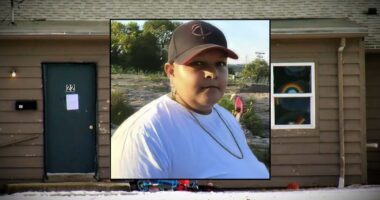
Donald Trump speaks at the annual Road to Majority conference in Washington, DC, June 22, 2024. (Allison Bailey/NurPhoto via AP)
In Washington state, a federal judge on Thursday stopped President Donald Trump’s executive order that aimed to end birthright citizenship in the United States. The order was deemed unconstitutional.
The hearing was overseen by U.S. District Judge John Coughenour, a nominee of President Ronald Reagan. The complaint, spanning 85 pages, had been filed earlier in the week in Seattle federal court by attorneys general from Washington, Oregon, Arizona, and Illinois.
After considering the arguments, Judge Coughenour issued a temporary restraining order against the implementation of the executive order on birthright citizenship. He explained that the order contradicted the fundamental principles outlined in the nation’s founding documents.
“This is a blatantly unconstitutional order,” Coughenour said during the proceedings, according to a report from The New York Times.
He continued, saying he couldn’t believe a licensed lawyer could believe the move to be constitutional.
“I have difficulty understanding how a member of the bar could state unequivocally that is a constitutional order,” the judge said, per the Washington Standard. “It boggles my mind.”
According to the filed complaint, Trump’s executive order to end birthright citizenship violates the 14th Amendment and the federal Immigration and Nationality Act. The States argue that a sitting president lacks the authority to override the U.S. Constitution, asserting that no provision or law empowers him to determine who should or should not be granted U.S. citizenship at birth.
The States further argued that the order would cause irreparable damage by having tens of thousands of children within their borders “stripped of citizenship” and left “with no immigration status.”
“The individuals who are stripped of their United States citizenship will be rendered undocumented, subject to removal or detention, and many will be stateless — that is, citizens of no country at all,” the complaint states. “They will lose eligibility for myriad federal benefits programs. They will lose their right to travel freely and re-enter the United States. They will lose their ability to obtain a Social Security number (SSN) and work lawfully. They will lose their right to vote, serve on juries, and run for certain offices. And they will be placed into lifelong positions of instability and insecurity as part of a new underclass in the United States.”
As Law&Crime previously reported, Trump made good on his campaign promise to end birthright citizenship with an order directing the secretary of state, attorney general, secretary of homeland security, and social security commissioner to cease recognizing citizenship for children whose parents are in the U.S. illegally or in the country on a legal but temporary basis after 30 days from the date the order was signed.
From the order:
“Policy. (a) It is the policy of the United States that no department or agency of the United States government shall issue documents recognizing United States citizenship, or accept documents issued by State, local, or other governments or authorities purporting to recognize United States citizenship, to persons: (1) when that person’s mother was unlawfully present in the United States and the person’s father was not a United States citizen or lawful permanent resident at the time of said person’s birth, or (2) when that person’s mother’s presence in the United States was lawful but temporary, and the person’s father was not a United States citizen or lawful permanent resident at the time of said person’s birth.”
Attorneys from Trump’s Department of Justice on Wednesday defended the president’s order in a 17-page opposition filing, arguing that the Fourteenth Amendment affords birthright citizenship to “those persons born in the United States and subject to its jurisdiction — and thus excludes children of noncitizens here illegally as well as children of temporary visa-holders.”
“That EO is an integral part of President Trump’s recent actions, pursuant to his significant authority in the immigration field, to address this nation’s broken immigration system and the ongoing crisis at the southern border,” the filing states. “As the President has recognized, individuals unlawfully in this country ‘present significant threats to national security and public safety,’ and the severity of these problems warrant a full panoply of immigration measures.”
Two lawsuits challenging the birthright citizenship order were also filed earlier this week in Massachusetts. One by the AGs of 18 states and two cities, and another on behalf of an expectant mother in the country through Temporary Protected Status and her unborn child, who is due in March 2025.











